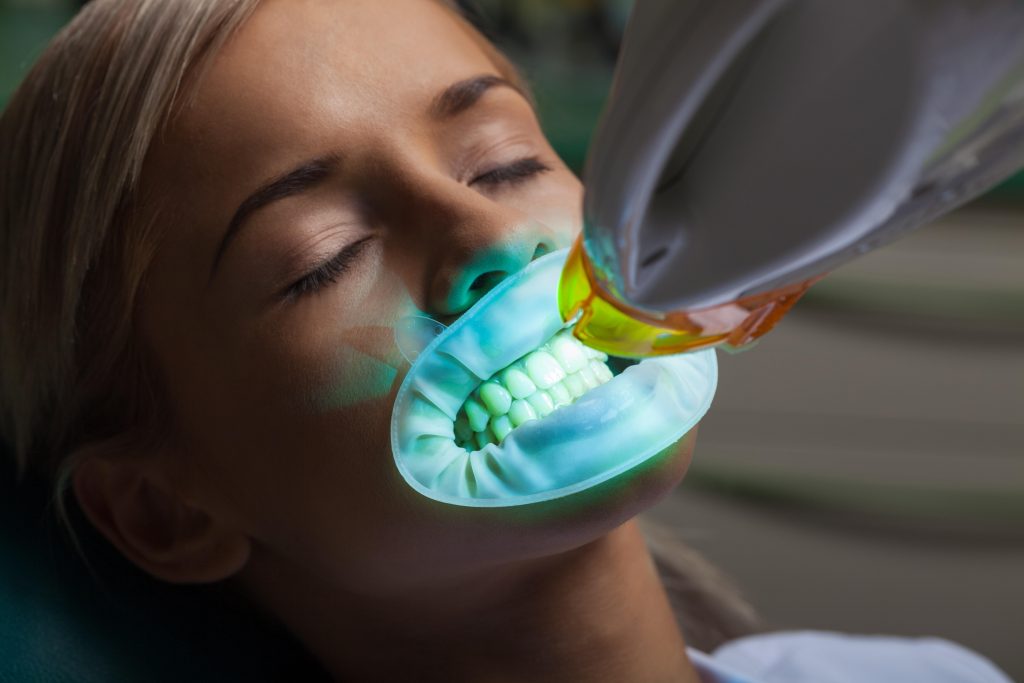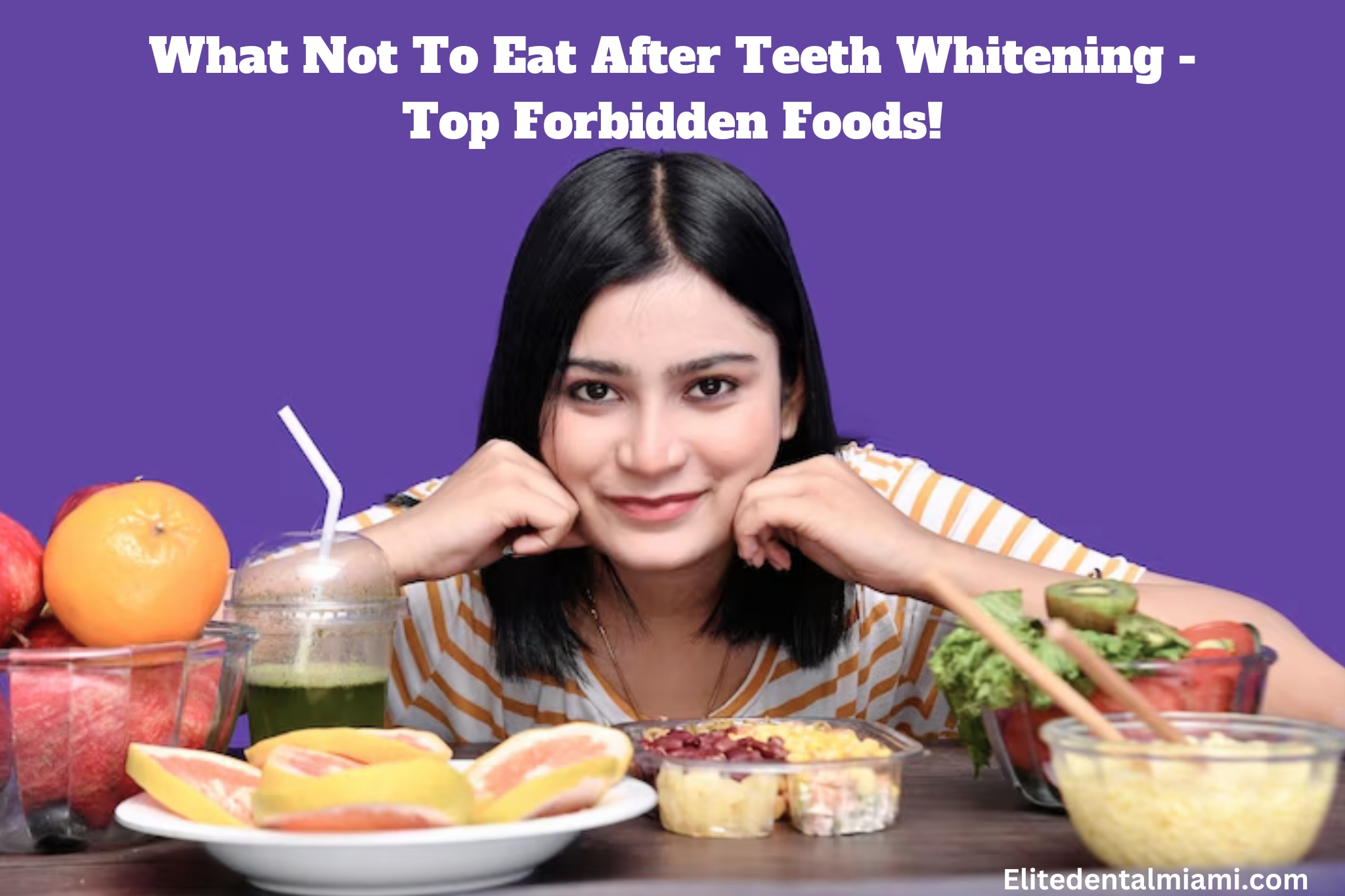Not To Eat After Teeth Whitening & Avoid consuming dark or strongly colored foods and beverages, such as coffee, red wine, and berries, immediately after teeth whitening. Steer clear of acidic foods like citrus that can increase sensitivity.
Maintaining your dazzling smile after a teeth whitening procedure means being mindful of your diet. Your teeth are especially susceptible to stains within the first 48 hours following treatment. Dentists advise that during this period, you should follow a “white diet,” which includes foods like chicken, rice, and clear beverages.
This precaution helps to extend the results of your treatment, ensuring that your teeth stay brighter for longer. Don’t let your hard-earned pearly whites be tarnished by a lapse in dietary judgment; choose your post-whitening foods as cautiously as you would select a whitening product or dentist. Sticking to the right food and drinks can make all the difference in maintaining your tooth whitening results.
Post-whitening Diet Do’s And Don’ts
Stepping out of the dentist’s office with a newly whitened smile feels fantastic. But this bright and shiny confidence comes with a small price—a cautious diet for the next few days. The foods and beverages you consume immediately after whitening can either enhance or compromise your stunning results. Let’s delve into the essentials of post-whitening diet to maintain that gleaming smile.
Understanding The Sensitivity Post-whitening
It’s common for teeth to become sensitive after a whitening treatment. The process temporarily opens the pores in your teeth, making them more susceptible to temperature changes and staining agents. During this period, it’s crucial to avoid hot or cold food items that can increase discomfort.
- Avoid: Ice cream, hot soups, or ice-cold drinks.
- Opt for: Room temperature and soft foods to minimize sensitivity.
The Importance Of Minimizing Staining
Post-whitening teeth are highly prone to discoloration. The open pores can absorb colors from foods and drinks, which can lead to stains. To ensure lasting results, adhere to a diet that reduces the risk of staining.
| Consume with Caution | Recommended Choices |
|---|---|
| Berries | White dairy products |
| Coffee and tea | Water, clear coconut water |
| Red wine | White wine |
| Colored sodas | Sparkling water |
| Soy sauce, tomato sauce | White sauce, alfredo sauce |
Remember, sticking to a ‘white diet’ shortly after whitening can make all the difference. This means consuming colorless or light-colored foods and drinks. Ensure you give your teeth the care they need to maintain their newfound luster.

Credit: www.yourdentistryguide.com
Foods And Drinks To Avoid
You’ve just invested in a brighter smile with teeth whitening, and naturally, you want to protect and prolong those pearly whites. Certain foods and drinks can stain or compromise your newly whitened teeth, leading to premature discoloration. Find out which culprits to avoid to maintain your luminous smile.
Dark Or Heavily Colored Beverages
To keep your teeth sparkling, steer clear of dark-colored drinks. These imperil your teeth’s whiteness by leaving persistent stains that can dull the effects of your whitening treatment. Here’s a list to consider:
- Coffee – Its rich color and acidity can yellow teeth over time.
- Tea – Even herbal teas can cause staining due to their tannins.
- Red Wine – Its deep hues are notorious for teeth discoloration.
- Colored Sodas – Artificial coloring and acids are a double threat.
- Dark Juices – Such as grape and cranberry juice, which have high pigment levels.
Acidic Foods And Drinks
Acidic consumables can erode enamel and expose the dentin, which is naturally yellower. To protect your teeth’s lustrous sheen, consider keeping these items off your plate:
- Citrus Fruits – Oranges, lemons, and grapefruits are highly acidic.
- Tangy Sauces – Tomato sauce and vinegary dressings.
- Pickled Vegetables – The vinegar used in the pickling process is acidic.
Sugary Snacks And Sweets
After teeth whitening, limiting sugary indulgences is crucial since sugar fosters bacteria growth, leading to plaque and potential staining. Aim to avoid or moderate the following:
| Type | Examples |
|---|---|
| Candy | Gummies, caramels, chocolate |
| Desserts | Cakes, cookies, sweet pastries |
| Icy Treats | Popsicles, colored ice creams |

Credit: Youtube
Monitoring Food Temperature
Post-teeth whitening, your teeth might be more susceptible to temperature extremes, which makes monitoring food temperature crucial for maintaining your comfort and protecting your dental work. Understanding which temperatures to avoid can help in minimizing tooth sensitivity and ensuring that your teeth whitening results last longer.
Hot And Cold Sensitivity
Teeth whitening procedures can temporarily leave your teeth feeling more sensitive to temperature. This means that imbibing in scalding hot soups or indulging in ice-cold beverages could cause discomfort or even pain. To keep sensitivity at bay, being mindful of avoiding these temperature extremes in the foods and drinks you consume after whitening is key.
- Avoid hot drinks like coffee or tea right after your treatment.
- Steer clear of icy treats such as ice cream or chilled smoothies.
- Opt for room temperature beverages and lukewarm meals to prevent triggering sensitivity.
Ideal Food Temperature For Comfort
For optimal comfort post-teeth whitening, aim for foods and beverages that are neither too hot nor too cold. Room temperature or slightly warm items are best at ensuring that you don’t aggravate your teeth and can enjoy your meals without any discomfort.
Here are a few suggestions for maintaining the ideal food temperature for comfort:
| Food Type | Ideal Temperature |
|---|---|
| Fruits and Vegetables | Room Temperature |
| Soups and Broths | Lukewarm |
| Beverages | Room Temperature |
| Dairy Products | Cool (not cold) |
Remember, immediately following your teeth whitening session, your teeth’s enamel will be more porous and more likely to absorb the color of foods and drinks. Alongside the temperature, it’s also important to consider the color and consistency of your food choices. Choose foods and beverages that are light-colored and free from intense colorants that could stain your freshly whitened teeth.
What Not To Eat After Teeth Whitening Specifics
Securing a luminous, brighter smile through teeth whitening isn’t the end of the journey—your eating habits in the ensuing hours and days play a pivotal role in maintaining those results. Let’s dive into the specific foods and drinks that could undermine your newly whitened teeth, and how long you should keep them off your menu to ensure your smile stays radiant.
Staining Foods That Sabotage Whitening Results
After teeth whitening, your enamel pores are open, making them vulnerable to stains. Avoiding foods and drinks notorious for staining is crucial during this period. These culprits include:
- Coffee and tea: These beverages can deposit deep stains on your teeth, dulling the whitening effect.
- Red wine: Known for its rich color, red wine can leave a lasting impression on your bright smile.
- Dark sodas and fruit juices: The pigments in beverages like cola and grape juice have strong staining properties.
- Soy sauce and balsamic vinegar: Dark condiments can be just as harmful to your whitening results.
- Berries and brightly colored fruits: Blueberries, pomegranates, and other colorful fruits could tarnish your teeth’s whiteness.
- Tomato-based sauces: Tomatoes’ deep red hue can seep into tooth enamel and cause discoloration.
- Candies and sweets: Sugary treats with strong colorants contribute to tooth staining.
To maintain the whitening effect, opt for lighter or clear foods and beverages such as white fish, rice, white wine, and water.
Timeframe For Avoiding The Top Forbidden Foods
The initial 48 hours post-whitening are crucial, as this is the period when your teeth are most susceptible to discoloration. During this window, it’s essential to steer clear of the aforementioned foods and drinks. However, to sustain the whitening effects, consider implementing the following habits:
- Drink dark beverages with a straw to minimize contact with teeth.
- Rinse your mouth with water after consuming potent-colored foods.
- Maintain a daily oral hygiene routine that includes brushing twice a day and flossing.
Maintaining a mindful diet not only ensures the longevity of your white teeth but also contributes to overall oral health. Remember, every bite and sip count when it comes to keeping that smile as bright as possible.
Safe Alternatives For A Whiter Smile
Maintaining a brilliant, white smile after a teeth whitening treatment involves being mindful of the foods and drinks you consume. The first 48 hours are critical, as your enamel pores are open and susceptible to stains. Opting for safe alternatives doesn’t mean sacrificing taste or nutrition. This guide highlights nutritious snacks and meals that support oral health while keeping your smile sparkling.
Recommended Snacks And Meals
Choosing the right foods after teeth whitening can make all the difference in preserving that pearly sheen. Pay special attention to foods that are less likely to stain your teeth.
- White Meat: Chicken or turkey are excellent protein-rich options that won’t threaten your newly whitened teeth.
- White Fish: Enjoy fish like cod or halibut, which carry a minimal risk of causing discoloration.
- Rice and Pasta: Stick to white rice and plain pasta, but avoid brightly colored sauces.
- Eggs: Scrambled or poached, eggs are a safe bet for a teeth-friendly meal.
- Dairy Products: White cheese, milk, and unsweetened yogurt can be part of your diet without risking stains.
| Food Group | Item | Notes |
|---|---|---|
| Protein | White Meat, White Fish | Protein without heavy pigmentation |
| Grains | Rice, Pasta | Opt for varieties without added colors |
| Dairy | Milk, White Cheese, Yogurt | Calcium-rich and safe for teeth |
Hydration Tips For Oral Health
Staying hydrated is key to maintaining oral health and a dazzling white smile. Here are some tips to help you keep hydrated while avoiding stains:
- Water is Your Best Friend: Sip on clear, still water throughout the day to wash away any potential staining agents.
- Coconut Water: Clear coconut water can be a hydrating alternative with added electrolytes.
- Milk: White and neutral, milk does not cause discoloration and provides calcium for strengthening teeth.
Remember, beverages like coffee, tea, and dark-colored sodas can quickly undo the effects of teeth whitening. Opt for these clear and safe hydration options instead to maintain the benefits of your treatment.
Navigating Social Eating
Embarking on a social outing after a recent teeth whitening session can pose unexpected challenges for your gleaming smile. It’s essential to make wise food and beverage choices to maintain that sparkle. Here, we provide practical tips to help you navigate the vibrant world of social eating without compromising your freshly brightened teeth.
Eating Out: Making Smart Choices
- Opt for lighter fare: When scanning the menu, look for dishes that are less likely to stain your teeth. Steer clear of sauces and curries with strong pigments, such as tomato sauce or soy-based dishes.
- Grilled over roasted: Choose grilled proteins instead of items that are barbecued or braised in dark marinades or sauces.
- Select your salad wisely: Fresh greens are great, but avoid toppings like balsamic vinaigrette or beet slices that can stain your pearly whites.
- Ask for substitutions: Don’t hesitate to request modifications to your dish to make it tooth-friendly. Restaurants are often happy to accommodate.
Alcohol And Celebratory Toasts: What’s Safe?
After teeth whitening, it’s important to avoid certain drinks during social events to prevent discoloration. Here are some safe options for raising your glass without dulling your smile:
- Clear spirits: Stick to colorless alcoholic beverages like vodka or gin, and mix them with clear mixers such as tonic water.
- Stay still with your bubbles: If sparkling wine is on the cards, choose a white or rosé over reds to minimize staining.
- Hydration is key: Alternate each alcoholic drink with a glass of water to help rinse away any potential staining agents.
- Sipping through straws: When appropriate, use a straw to keep the liquid away from the front surfaces of your teeth.

FAQs For What Not To Eat After Teeth Whitening
Why Avoid Certain Foods After Teeth Whitening?
Your teeth are more prone to discoloration after teeth whitening. It’s essential to avoid foods that are highly pigmented or acidic. These can diminish the whitening results. Stick to less colorful foods to maintain your bright smile.
What Foods Discolor Teeth Post-whitening?
Post-whitening, stay away from coffee, red wine, berries, and soy sauce. These items can quickly stain your freshly whitened teeth. Opt for lighter colored foods and drinks to prevent discoloration.
How Long To Avoid Dark Foods After Whitening?
It’s recommended to avoid dark, staining foods and drinks for at least 48 hours after teeth whitening. This timeframe allows the enamel pores to close and minimizes the risk of stains.
Can I Eat White Foods After Teeth Whitening?
Yes, you can eat white or light-colored foods after teeth whitening. Foods like chicken, rice, and white fish are safe choices. They help maintain your teeth’s brightness.
Conclusion
Maintaining a bright smile after teeth whitening doesn’t have to be a chore. Just remember, certain foods are best avoided to prevent stains. Stick to dentist-approved choices and your pearly whites will thank you. Smile confidently knowing you’re keeping your teeth gleaming and stain-free!

I am a dentist and also blog regularly. my target audience is America Europe & providing regular information for them.
